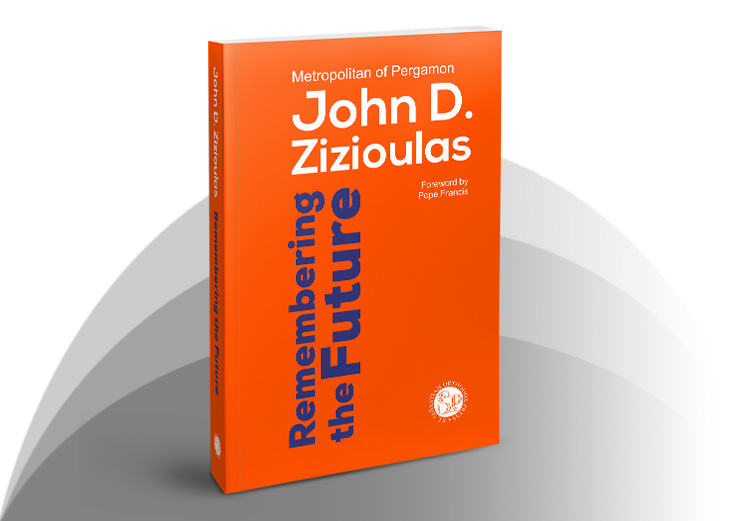Toward an Eschatological Ontology
Los Angeles: Sebastian Press 2023
The posthumous book Remembering the Future, by the late Metropolitan of Pergamon John Zizioulas of blessed memory, is a truly remarkable book. Through its impressive documentation and abundant bibliographical references, it opens exciting and challenging perspectives for theological dialogue, for discussing Biblical hermeneutics and for evaluating practices existing in the life of the Church related to preaching the Gospel and teaching the essentials of Christian Faith. The decisive achievement of the book is that it brings the reality or activity of eschatology, i.e., Christ’s teaching about His second coming and about the resurrection of the dead and the last judgment, to the center of serious discussion, comprehensively in terms of biblical, systematic, liturgical or practical Theology. The truly unforgettable late Metropolitan of Pergamon successfully transfers eschatology from the end of the books of systematic theology to the center of them and makes the teaching about eschatological ontology a relevant and vital topic for our Church today.
Archbishop Demetrios Trakatelis, Former Archbishop of America
Metropolitan John Zizioulas is the most recognizable and ecumenically impactful Orthodox theologian since St. John of Damascus. He carries forward the patristic tradition in a way that meets his mentor’s (Florovsky) call for a “neo-patristic synthesis,” but without shying away from bold and creative proposals that respond to contemporary questions and challenges. This book, his final monograph, is a gift that clarifies and extends his profound insights in Trinitarian theology, theological anthropology, creation theology, ecclesiology, and, of course, eschatology. His theological legacy is sure to endure not only in Orthodoxy, but in the history of Christian theology.
Aristotle Papanikolaou, Professor of Theology, Archbishop Demetrios Chair in Orthodox Theology and Culture, Co-founding director, Orthodox Christian Studies Center, Fordham University, USA
In the last few years, and even during the period of the pandemic, John Zizioulas attempted to reconstruct his entire work on the axis of eschatological hermeneutics and ontology, considering that what is indeed real is that which will be real in the last days. Drawing on the biblical and patristic tradition, as well as on the Eucharistic experience and theology of the Church, the late Metropolitan John Zizioulas of Pergamon reintroduces and highlights the forgotten eschatological ontology at the heart of theological thought. Creation and humanity, evil and the fall, science and art, the Church and liturgical time, the ontology of the person and love, are all illuminated and reformulated through the perspective of the coming Kingdom in an eschatological ontology centered on the person and work of the risen Christ. The relationship between history and eschatology is "epiphanic" but the end times are not to be seen either as the conclusion of a dynamic of historical becoming, in the Aristotelian sense of entelechy, or even as a return to the original ideal state in a Platonic way. It is rather a dialectical relation, in which the eschaton "invades" with the presence of Christ in History, without being transformed into History. This dialectical relation is experienced and realized pre-eminently in the Eucharistic remembrance of the future, which introduces into theological and philosophical language and thought the notion of an "iconological ontology". This means that the ultimate truth of beings is really present in History, but only in the form of the Cross and the "sacramental" presence of the risen Christ. What is now experienced "already" and "not yet" will in the last days be a perfect and unfailing state. The connection between truth and the eschaton is based, above all, on the theology of St. Maximus the Confessor, for whom truth is a state of the future.
Stavros Yangazoglou, Associate Professor of Dogmatics, Department of Theology, National and Kapodistrian University of Athens
I am delighted and excited to have received a copy of Metropolitan John’s “Remembering the Future”. Congratulations on the splendid appearance of the volume—its striking and dramatic cover befits the momentous contents within. I have always been captivated by Metropolitan John’s understanding of eschatology. As aptly noted in the Preface, this book represents his Grand Unified Theory. I am already quite familiar with the book’s final chapter, and I cannot wait to delve into it again, now within the proper context of Metropolitan John’s comprehensive eschatological vision.
Fr. Paul McPartlan, Carl J. Peter Professor of Systematic Theology and Ecumenism at the Catholic University of America
A copy of Metropolitan John's book, „Remembering the Future,“ is a priceless gift. I hope his reflections from this book will continue to fertilize the Church and enable it to reach out prodigiously to human beings and all creatures in the present from the future. The late Metropolitan watches over us from Heaven.
Fr. Dario Chiapetti, friar minor of the Tuscan Province of St Francis Stigmatised, Doctor in Sacred Theology at the Facoltà Teologica dell’Italia Centrale
"The death of the particular person cannot be tolerated by the Christian faith. Only if the resurrection somehow intervenes in the course of time can the particular survive and time be redeemed." Met John Zizioulas’ crowning opus, fittingly published after his repose, distills from Patristic and Liturgical sources to construct the philosophical scaffolding needed to situate the ever-being communion of persons, time, history and nature, where according to Apostolic testimony, they have always belonged: re-membered eternally in the Risen and Ascended Christ Who is present Eucharistically through the Holy Spirit and yet still to come in the Eschaton of the New Jerusalem. It is a refreshing and reorienting volume, revealing new facets of the one Great Truth of the Church: that we who are divided are being re-membered together with all life, by Christ who IS our future. Don’t miss it!
Fr. Stephen Muse, PhD, LMFT, LPC, Clergy-in-Kairos program at Pastoral Institute in Columbus, Georgia, Mercer University School of Medicine


